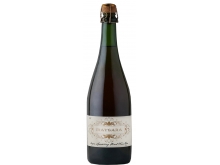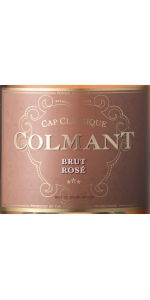Maysara Sparkling Pinot Noir Rose NV
12 bottles with free shipping for: $420.00
| BUY MORE! SAVE MORE! | ||||||||||||||||
|
| Country: | United States |
| Regions: | Oregon Oregon (Willamette) |
| Winery: | Maysara Winery |
| Grape Type: | Pinot Noir |
| Organic: | Yes |
| Vintage: | NV |
| Bottle Size: | 750 ml |
Maysara Sparkling Pinot Noir Rose is made from 100 percent Rose.
A stunning sparkling rosé made with 100% Pinot Noir grapes, that is balanced with high tension acidity and minerality. The fine bubbles keep the aromatics tight with a clean finish of dried cranberries, pomegranate, and wild strawberries.
Pair with soft cheeses, fried chicken, oysters, Mediterranean salads.
Maysara winery is nestled in the foothills of the McMinnville AVA, in Oregon's Willamette Valley. The Momtazi family is dedicated to biodynamic farming practices. What makes Maysara unique is that there is over 600 feet elevation gain in the vineyards. From the property's lowest point at 120 feet to around 600 feet, the soil is clay and loam based (similar to most of the valley). From 600-780 feet, there is Jory soil (a red earth loaded with iron and mineral deposits). Quite a bit of the McMinnville AVA has this top soil. What makes this part of Maysara's vineyard special is that there's 10 feet of this earth before the base of loam and calcareous sub-soil.
Maysara Wines reflect this commitment to terroir, showing a purity of fruit and earth, that are true to the soils from which they come.
On April 1st, 1997, Moe and Flora Momtazi bought 496 (of the now 532) acres of abandoned wheat farm just south of their home in McMinnville, Oregon. Though wild and untouched, Moe’s vision for the Momtazi Estate was born looking out across the thriving hills of land that had been free of chemicals for seven years.
Though using chemicals would have been faster and more economical while building infrastructure and reclaiming the land, not a single one has or will be used throughout the estate. Instead, the ground was turned over multiple times during the summer of 1997 in order to eliminate unwanted plants and weeds while returning the soil to a usable state.
They began planting in March of 1998, with 13 acres of self-rooted pommard pinot noir vines. After months of researching the relationships between specific pinot noir clones, rootstocks and the different soil types found across the estate, over 120,000 plants were grafted in the greenhouses and planted in the vineyard by the end of the summer in 1999.
They believe that 90% of winemaking takes place in the vineyard. Because of this, they have held themselves to a strict form of land use acting as stewards of the land in order to nurture and reap the rewards naturally. Their alternative approach to chemical use is growing a variety of medicinal and dynamic flowers and herbs that they make into compost teas. By steeping into teas, they’re able to harness the beneficial properties of each flower and herb and embody a “from nature to nature” philosophy. As such, their multiple compost piles and Biodynamic preparations are extremely important for their vineyards because the resulting humus is worked into their vineyard in order to achieve long-term soil and vine health.
Their unique niche in the foothills of Oregon’s Coast Range separates them from valley weather influences providing warmer days and cooler nights with less precipitation during the harvest season. The property has highly diversified soil types consisting primarily of Nekia and Yamhill series, laced with veins of Peavine and Jory. By training their vines to produce between 1.75-2.25 tons per acre, they believe they are getting the best fruit possible from their unique terroir.
BIODYNAMICS
Biodynamics is an ultra-organic way of farming stemming from the two words; biological and dynamic. The biological aspect is practiced throughout organic farming and includes; composting, cover cropping, green manuring, cultivation, companion planting and integration of animals throughout the farm. The dynamic effects are extremely important, maybe even more-so than the biological. They include planning and planting by a calendar (i.e. near and far stars), Biodynamic composting, peppering and radionics, along with homeopathy. Therefore, both the biological & the dynamic effects are practiced and implemented.
In Biodynamics the farm is considered a living organism — having its own individuality and soul. As such the farm is believed to be sick if it imports any fertilizer from the outside; therefore being self sufficient is an important part of Biodynamic farming. Soil is considered to be the foundation of agriculture, therefore enriching the soil is an important task. A farmer is comparable to the conductor of an orchestra — bringing all the individual forces and energies into harmony by playing the right notes at the right time.
We distribute our own compost, inoculated with the Biodynamic preparations and distribute it underneath the vines as needed. We have also eliminated the use of minerals which need to be mined from the earth. Instead, we grow a variety of herbs and flowers that have been used medicinally for thousands of years (i.e. Chamomile, Dandelion, Yarrow, Valerian, Horsetail, Stinging Nettle, etc.). We make teas with them to be sprayed either on the foliage (on leaf days) or injected through the irrigation line to the root system (on root days). We apply these teas in homeopathic amounts in order to maintain the vitality and healthy immune system of the plants. Plants do not need to be shocked with penicillin like treatments if they are “brought up” with healthy immunities to pests and diseases.
In the winery, we allow the native yeast found on the grape skins to naturally initiate primary fermentation. No commercial yeast or enzyme use is allowed and we do not adjust acidity or add sugar. The secondary or malolactic fermentation also occurs on its own without any additives.
MCMINNVILLE AVA
The McMinnville American Viticultural Area is a sub-appellation of the Willamette Valley, nestled in the Coast Range foothills of Yamhill County that was created in 2005 after a successful petition that began in 2002. The soils found in the McMinnville AVA are primarily made up of both sedimentary and volcanic soils such as loams and silts with an underlying base of basalt. Beneath an average of 20-40 inches of clay and soil, lies hard stone mixed with basalt pebbles and compressed sediment that gives off minerality. It’s this unique soil diversity and the location at the mouth of the Van Duzer corridor that gives the McMinnville Pinot Noirs their dark fruit flavors and spicy earth tones, while allowing whites like Pinot Gris, Blanc and Riesling to attain a bright fruit-forwardness and vibrant acidity.
Maysara Jamsheed Pinot Noir is made of 100 percent Pinot Noir
11 months in 10% new French oak barrels
According to ancient Persian legend, King Jamsheed was able to observe his entire realm by peering into his full wine goblet.
Beginning with a generous core of red-black fruits, the McMinnville AVA saunters over the palate with both bravado and grace. Blackberry and fresh cracked pepper entwine perfectly with matured and lengthy tannins on the finish. The depth of this unassuming bottling is always an adventure to mine. Some older prospectors hear tell of herbal notes… silver sage? rosemary?
At Maysara Winery & Momtazi Vineyard, we are committed to cap-turing the complete expression of our land and conveying it to you through superior quality in every bottle. We practice only low-impact, holistic farming methods in our Demeter Certified Biodynamic Vineyard. We are confident these practices are the best way to capture the true essence of the soil in our fruit and ensure health of our vines and the unique accent of our terroir for generations. This philosophy is carried into the cellar, where Demeter Certified Biodynamic wine-making practices produce wines with intensity, sophistication and elegance while maintaining a purity of both fruit and earth.
Always offering generous accessibility, pair Jamsheed with darker fowl, grilled meats or salmon, even caramelized veggies.
Maysara Jamsheed Pinot Noir is made of 100 percent Pinot Noir
11 months in 10% new French oak barrels
According to ancient Persian legend, King Jamsheed was able to observe his entire realm by peering into his full wine goblet.
Beginning with a generous core of red-black fruits, the McMinnville AVA saunters over the palate with both bravado and grace. Blackberry and fresh cracked pepper entwine perfectly with matured and lengthy tannins on the finish. The depth of this unassuming bottling is always an adventure to mine. Some older prospectors hear tell of herbal notes… silver sage? rosemary?
At Maysara Winery & Momtazi Vineyard, we are committed to cap-turing the complete expression of our land and conveying it to you through superior quality in every bottle. We practice only low-impact, holistic farming methods in our Demeter Certified Biodynamic Vineyard. We are confident these practices are the best way to capture the true essence of the soil in our fruit and ensure health of our vines and the unique accent of our terroir for generations. This philosophy is carried into the cellar, where Demeter Certified Biodynamic wine-making practices produce wines with intensity, sophistication and elegance while maintaining a purity of both fruit and earth.
Always offering generous accessibility, pair Jamsheed with darker fowl, grilled meats or salmon, even caramelized veggies.
Maysara 3 Degrees Pinot Noir is 100 percent Pinot Noir
Aged 11 months in neutral French oak barrels
3° (Three Degrees) Pinot Noir is handcrafted by the Momtazi sisters whose differing personalities; combined with elegance, finesse and balance, reflect the dynamic characteristics of the Momtazi Vineyard. The sisters, Tahmiene, Naseem and Hanna, set out to make a pinot that tastes great and has the highest quality fruit all while being affordable for everyone.
Intriguing notes of fresh earth, oak leaves and pepper are woven together in the initial impression. Lifted, verdant tannins give this wine a firm structure for the vintage to showcase its characteristic starry-eyed smile.
At Maysara Winery & Momtazi Vineyard, we are committed to cap-turing the complete expression of our land and conveying it to you through superior quality in every bottle. We practice only low-impact, holistic farming methods in our Demeter Certified Biodynamic Vineyard. We are confident these practices are the best way to capture the true essence of the soil in our fruit and ensure health of our vines and the unique accent of our terroir for generations. This philosophy is carried into the cellar, where Demeter Certified Biodynamic wine-making practices produce wines with intensity, sophistication and elegance while maintaining a purity of both fruit and earth.
Momtazi Vineyard.
A vibrant and snappy pinot that will shine and refresh when paired with curries, spetzatinas and rich stews.
Maysara Asha Pinot Noir is made from 100 percent Pinot Noir
22 months in 40% new French oak barrel
Asha is an ancient Persian Word describing one who has a clean conscience for good thoughts, words, and deeds with a pure demeanor and performance.
A bejeweled glassful of garnets, Asha snakes onto your palate with amarena cherries, clove and a tantalizing whisp of … what is that? A distant campfire? Elegant and slippery tannins sway to a tune played upon vanilla violins.
At Maysara Winery & Momtazi Vineyard, we are committed to cap-turing the complete expression of our land and conveying it to you through superior quality in every bottle. We practice only low-impact, holistic farming methods in our Demeter Certified Biodynamic Vineyard. We are confident these practices are the best way to capture the true essence of the soil in our fruit and ensure health of our vines and the unique accent of our terroir for generations. This philosophy is carried into the cellar, where Demeter Certified Biodynamic wine-making practices produce wines with intensity, sophistication and elegance while maintaining a purity of both fruit and earth.
Pair with dishes that utilize slow braised meats, something with complex layers of spices and caramelization, as the mid-palate is ensorcelled with lively acidity and don't forget those tannins!
Maysara Asha Pinot Noir is made from 100 percent Pinot Noir
22 months in 40% new French oak barrel
Asha is an ancient Persian Word describing one who has a clean conscience for good thoughts, words, and deeds with a pure demeanor and performance.
A bejeweled glassful of garnets, Asha snakes onto your palate with amarena cherries, clove and a tantalizing whisp of … what is that? A distant campfire? Elegant and slippery tannins sway to a tune played upon vanilla violins.
At Maysara Winery & Momtazi Vineyard, we are committed to cap-turing the complete expression of our land and conveying it to you through superior quality in every bottle. We practice only low-impact, holistic farming methods in our Demeter Certified Biodynamic Vineyard. We are confident these practices are the best way to capture the true essence of the soil in our fruit and ensure health of our vines and the unique accent of our terroir for generations. This philosophy is carried into the cellar, where Demeter Certified Biodynamic wine-making practices produce wines with intensity, sophistication and elegance while maintaining a purity of both fruit and earth.
Pair with dishes that utilize slow braised meats, something with complex layers of spices and caramelization, as the mid-palate is ensorcelled with lively acidity and don't forget those tannins!
Ayni is the quechua name of a principle of reciporcity practised for centuries by the andean cultures, it means in order to receive something you first have to give. Ayni is also the name of our most special vineyard, located in Paraje Altamira one of the best appelations within Uco Valley in Mendoza.
Argentina has a history of sparkling wine production since the early 1960’s.
Tasting Notes: Aged for 18 months on its lees before disgorgement. It’s a creamy with a nice toast aroma. It is made in a well-balanced style, with fine bubbles and a dry, palate-cleansing finish.
Vineyards: 100% Altamira in the Uco Valley subregion
Soil type: Sandy loam over calcium carbonate coated gravels, 30 to 50 cm deep
Grapes: 100% Pinot Noir
Average age of the vines: 10 years
Winemaking: Methode Traditionnelle (Champenoise). Aged sur lattes for 18 months. Made following the tratidional method, fermentation goes until it gets totallay dry. No liquor is added to keep the freshnes, elegance and purity of is clean profile.
A versatile wine, good on its own or paired with any food.
"An impressive first release for this all-Pinot Noir bubbly from Paraje Altamira, aged for 18 months on its lees before disgorgement. It’s a creamy, bready, well-balanced style, with fine bubbles and a dry, palate-cleansing finish. A fizz to watch. 2017-22"
- Tim Atkin (Argentina Special Report 2017), 92 pts
"Perhaps with the same sort of structural power that Altamira reds possess, this sparkling rosé shows something immutable in body, lively texture, bracing acidity. The wine spent 18 months on the lees and this, no doubt, provides flavor complexities well beyond the fruit, but still the fruit predominates with intense aromas, substantial, and crisp, lively acidity. If what you’re looking for is a sparkler for carpaccio or roast beef, this is it."
- Descorchads 2018, 94 pts
Lovely salmon pink color. A very delicate nose of strawberry and redcurrant fruit with floral undertones. There is a silky richness on the palate full of red berries balanced with a subtle bready texture. Very accessible. Will also develop nicely over time.
Colmant Brut Rose NV is made from 75% Pinot Noir and 25% Chardonnay
This wine spends a minimum of 24 months on the lees at a consistent temperature of 14C before degorgement.15% of the base wine has been barrel fermented.
Pinot Noir 75%, Chardonnay 25% (Franschhoek, Robertson and Elgin).
15% of the blend is made of reserve wine from the previous vintages and 15% of the base wine is barrel fermented.
This wine spends a minimum of 24 months on the lees at a consistent temperature of 14°C before degorgement.
Perfect as a summer sundowner. A delicious complement to white meat, strawberry dessert and decadent dark chocolate.
Review:
"The Brut Rosé (disgorged March 2018) is a blend of 75% Pinot Noir and 25% Chardonnay with 15% base wine and 15% reserve wine, with the Pinot Noir macerated on its skins for color, matured on the lees for 24 months. Deep salmon in color, it has a fine mousse and attractive strawberry and cherry scents on the nose - no shy and retiring rosé here. The palate is well balanced with Braeburn apples, hints of strawberry and a touch of tart cherries fanning out toward the creamy-textured, satisfying finish. A sparkling rosé that’s proud to be pink!- Neal Martin"
- Vinous (August 28th 2018), 91 pts
- back
Arzuaga Ribera del Duero Crianza 95% Tempranillo and 5% Cabernet Sauvignon.
Dark cherry color with purple highlights. Powerful nose and high aromatic diversity of ripe red and black fruits, spicy and balsamic notes, and a roasted finish. Soft and mellow in the mouth with a great fruitiness and length.
Review:
This is a big wine with alluring aromas of cedary oak and black fruit. Ripe palate of black berries, some dark chocolate and integrated, polished oak. Long spicy finish. Classy Ribera. -Decanter 95 Points
Louis Roederer Cristal Vinotheque Edition Brut Millesime 1997 is made from Pinot noir (62%) and Chardonnay (38%).
Color
A bright and shimmering golden color, animated by an ultra-fine and swirling effervescence.
Nose
The bouquet is pure, precise and complex, mixing aromas of white flowers, almond, honey and nougat. Upon aeration, notes of red fruits and smoke are revealed, followed by warm and caramelized nuances reminiscent of macaroon, baked apples and tarte tatin.
Palate
Indulgent and velvety, the palate is rich while maintaining a great freshness thanks to a delicate effervescence. The flavors of candied Corsican citron stretch out on a finish marked by a chalky, powdery and iodized freshness, offering a dense texture and a serene length.
The property
Founded in 1776 in Reims, the Louis Roederer Champagne House has remained family-owned and independent. After more than 200 years of existence, the Louis Roederer House is still in the hands of the same family. Today led by Frédéric Rouzaud, who represents the seventh generation of the lineage, the Louis Roederer House embodies the excellence of Champagne wines around the world thanks to cuvées crafted like a work of art.
The vineyard
With nearly 241 hectares of vines, the Louis Roederer House draws its strength from its extraordinary vineyard, composed only of Grands and Premiers Crus in the Marne Valley, the Montagne de Reims and the Côte des Blancs. A true mosaic of terroirs, the Louis Roederer House's vineyard is divided into 410 plots that reflect all the diversity of the Champagne soils.
The wine
Cristal Vinothèque 1997 is made from three great vineyards known as "La Rivière", "La Montagne" and "La Côte".
The vintage
The spring of 1997, mild at first, was marked by an early bud break followed by severe frosts in April that damaged the vineyards of Verzenay and Verzy. After an early flowering in June, the rainy and cold weather until August favored the development of mildew and rot. Fortunately, the return of warm and sunny weather in August and September saved the vintage, with harvests taking place under radiant sunshine from September 15 to October 1.
Vinification and aging
Vinification is carried out in wood to the extent of 6%. Malolactic fermentation (16%). The cuvée was aged for 15 years on lees, 5 years on points and benefited from a rest of 4 years after disgorging. The dosage of this 1997 vintage champagne is 8 g/liter.
Review:
Intense nose of preserved lemons, salted yellow plums, walnuts, toast, salted caramel, roasted chestnuts and dried pineapple. Beautiful and complex, from 15 years, 5 years en pointe, before disgorgement in 2018. Delicious, salty toffee character. Soft, silky bubbles. Long and powerful. Thought-provoking. Unique. Will be launched in September 2022. Drink on release or hold.
-James Suckling 99 Points










